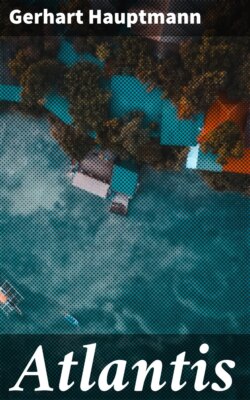Читать книгу Atlantis - Gerhart Hauptmann - Страница 8
На сайте Литреса книга снята с продажи.
V
ОглавлениеTable of Contents
"Do you know, Doctor von Kammacher," Füllenberg said suddenly, "that little Hahlström is on board?"
"What little Hahlström do you mean?" asked Frederick coolly.
Hans Füllenberg could not contain his surprise that Frederick should have forgotten little Hahlström. He was sure of having seen him in the Künstlerhaus in Berlin when Ingigerd danced her dance there for the first time, the dance that then aroused admiration only in the artist world, but later became the sensation of all Berlin. He described the affair.
"The pick of the Berlin artists were standing around the room and on the stairs in informal groups, leaving the centre of the floor clear. Even Menzel and Begas were there. A special exhibition was to open soon, and the walls were hung with a collection of Böcklin pictures. The name of the dance was 'Mara, or the Spider's Victim.'
"I tell you, Doctor von Kammacher," the young man went on, "if you didn't see that dance, you missed something. In the first place, little Ingigerd's costume was very scanty, and then her performance was really wonderful. There are no two opinions about it. A huge artificial flower was set in the middle of the room, and the little thing ran up and smelt of it. She felt all about the flower with closed eyes, vibrating as if with the gauzy wings of a bee. Suddenly she opened her eyes and turned to a rigid statue of stone. On the flower was squatting a huge spider! She darted like an arrow to the farthest corner of the room. Even in the first part of the dance she had seemed to float without weight in the air; but the way sheer horror blew her across that room made her seem like nothing but a vision."
Frederick von Kammacher had seen her dance the dreadful dance, not only at the matinée in the Künstlerhaus, but eighteen times again. While Füllenberg was trying to express his impression with "great," "tremendous," "glorious," and similarly strong epithets, Frederick saw the whole dance over again with his mind's eye. He saw how the childlike body, after cowering and trembling a while in the corner of the room, approached the flower again to the accompaniment of music played by a tom-tom, a cymbal, and a flute. Something which was not pleasure drew her to it. The first time she had traced her way to the source of the perfume by sniffing fragrance in the air. Her mouth had been open, the nostrils of her fine little nose had quivered. Hans Füllenberg was correct in his observation that her eyes, as she held her head back, had been closed. The second time, she seemed to be drawn against her will by a gruesome something, which alternately aroused fear, horror, and curiosity. She held her eyes wide open, and now and then covered them with both hands, as if in dread of seeing something hideous.
But when she came quite close to the flower, all fear suddenly seemed to drop away from her. She hopped for joy and laughed—she had been needlessly alarmed. How could a fat, immobile spider squatting on a flower be dangerous to a creature with wings? This part of her dance was so graceful, so full of droll, bubbling, childlike merriment, that the audience laughed tears of delight.
Now, however, a new phase of the dance began, introduced in a thoughtful strain. Having danced herself to satiety and intoxicated herself with the flower's perfume, Mara, with movements of agreeable fatigue, made as if to lay herself to rest, but delayed here and there to brush from her body something like the threads of a spider's web, at first serenely and pensively, then with growing disquiet, which communicated itself to the onlookers. The child paused, reflected an instant, and apparently was about to laugh at herself because of the fears that had arisen in her soul; but the next minute she paled with fright, and made a dexterous leap, as if to free herself from a trap. Her blond hair tossed back in Mænadic waves turned into a flaming stream. Her whole appearance evoked involuntary cries of admiration.
The flight began. And now the theme of the dance was Mara's entanglement in the threads the spider wove about her, which gradually choked her to death. No dancer has ever executed such an idea with equal skill and fidelity.
The little creature freed her foot from the meshes, only to find her neck entwined; she clutched at the threads about her throat, only to find her hands entangled; she tore at the cobweb, she bent her body, she slipped away; she beat with her fists, she raged, and only enmeshed herself the more tightly in the horrible skein; finally she lay fast bound. During this last phase of the dance, her artist audience stood there rigid, breathless, suffocating with a sense of horror.
It was not until nearly the end that Frederick von Kammacher felt that his fate was forever linked with this girl. The feeling grew stronger during the few moments that remained before the conclusion of the performance. The poison of infatuation came from the expression of her face. He noted precisely how it forced its way into him and how his whole being suddenly grew sick. When little Ingigerd Hahlström once more opened her eyes with a look of abysmal dismay, and fastened them in helpless inquiry upon the spider, calmly drinking her blood away, an inner voice seemed to command Frederick to become her compassionate knight, saviour, and protector.
